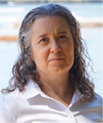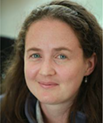Development of Australia’s National Action List for offshore CCS
David Midgley A , Linda Stalker B * , Andrew Ross B , Stephen Sestak C , Sharon Hook D , Emma Crooke B and Charles Jenkins EA
B
C
D
E

David Midgley has a BSc in Botany/Plant Biology (Macquarie University, 1997) and PhD in Mycorrhizal Fungal Ecology (University of Western Sydney, 2003). He is currently Team Leader of the Biogeochemistry and Microbiology Team. His expertise includes mycology, mycorrhizal biology, bioinformatics, anaerobic microbiology and microbial ecology applied to a host of environments including plant leaves and roots, biological filters, industrial holding ponds, mine sediments, animal digestive tracts, in soils, freshwater systems (rivers, creeks and lakes), marine sediments, in shallow aquifers, and in the deep subsurface. https://people-my.csiro.au/m/d/david-midgley |

Linda Stalker has a BSc (Hons) Applied Geology (Strathclyde University, Scotland 1990) and PhD Petroleum Geochemistry (University of Newcastle-upon-Tyne, UK, 1994). She has held academic and industry roles before joining CSIRO in 2000. Her work on the fate of CO2 in the subsurface commenced during her PhD and been applied to numerous research and industry projects. She is a Senior Principal Research Scientist. https://people-my.csiro.au/s/l/linda-stalker |

Dr Andrew Ross gained his PhD in Petroleum Geochemistry from the University of Newcastle upon Tyne, UK in 2004 following his qualifications in petroleum geoscience, marine biology and oceanography. He joined CSIRO in 2004 and is group leader of the Geochemistry, Geosystems and Geodata teams. He has led research focused on marine geology and hydrocarbon seepage, the development of hydrocarbon sensor systems, oil spill monitoring, deep water environmental characterisation, carbon capture and storage offshore monitoring and is currently focused on understanding mechanisms and approaches required for the energy transition. |

Stephen Sestak holds a BSc and PhD in Analytical Chemistry. He has worked for CSIRO for over 20 years in analytical chemistry, instrument and sensor design. |

Sharon Hook has a BA in Biological Sciences from Smith College, Northampton, USA (1995) and PhD in Coastal Oceanography from SUNY Stony Brook, USA (2001). Following various academic roles, she is now a CSIRO Principal Research Scientist in modern -omics based approaches to environmental problems, monitoring impacts and risks of toxic responses and the design of toxicity testing. |

Emma Crooke holds a Bachelor of Engineering (Industrial Chemistry) from the University of New South Wales. She has worked for a number of years at ANSTO before joining CSIRO in 2007. She has been a research technician, working in analytical chemistry, instrumentation and sensor development including marine monitoring. |

Charles Jenkins holds a BSc (Hons) (Witwatersrand, 1977) and PhD (Cambridge, 1981). He has worked for a range of industry and academic institutions before working with CO2CRC. He joined CSIRO to lead activities in CCS monitoring and verification. Charles is a senior principal research scientist and won numerous awards. https://people-my.csiro.au/j/c/charles-jenkins. |
Abstract
A review of international and domestic policy and legislative requirements by the Department of Climate Change, Energy, the Environment and Water (DCCEEW) identified several requirements for implementation of the 1996 Protocol to the Convention on the Prevention of Marine Pollution by Dumping of Wastes and Other Matter 1972 (the London Protocol) for offshore storage of CO2 in Australian waters, including a National Action List (NAL). The Commonwealth Scientific and Industrial Research Organisation (CSIRO) has been contracted by DCCEEW to undertake a joint program of work on Australia’s offshore carbon capture and storage (CCS) NAL. A literature review has identified components found within CO2 streams, their concentrations and potential impacts to environmental and/or human health. Benchmarking CO2 specifications has been possible by reviewing a wide range of CO2 storage project specifications and shows how these have evolved as CO2 providers have changed and capture technologies have advanced. Appraisal of the potential risks of each incidental associated substance (IAS) within CO2 streams was then considered including assessment of toxicity, pathway to harm, risk to workers and the environment. This has resulted in development of an interim NAL which specifies the levels of allowed contaminants within CO2 streams for offshore sequestration. DCCEEW published the Interim NAL in February 2024. Further work has been ongoing, including incorporating industry feedback on the interim NAL where relevant on an offshore CCS NAL with upper and lower levels of IAS. This presentation will discuss CSIRO’s contribution to the technical aspects of the development and evolution of the interim NAL.
Keywords: CCS, CO2 quality, co-contaminants, impurities, London Protocol, offshore storage, Sea Dumping Act, transboundary shipping.
 David Midgley has a BSc in Botany/Plant Biology (Macquarie University, 1997) and PhD in Mycorrhizal Fungal Ecology (University of Western Sydney, 2003). He is currently Team Leader of the Biogeochemistry and Microbiology Team. His expertise includes mycology, mycorrhizal biology, bioinformatics, anaerobic microbiology and microbial ecology applied to a host of environments including plant leaves and roots, biological filters, industrial holding ponds, mine sediments, animal digestive tracts, in soils, freshwater systems (rivers, creeks and lakes), marine sediments, in shallow aquifers, and in the deep subsurface. https://people-my.csiro.au/m/d/david-midgley |
 Linda Stalker has a BSc (Hons) Applied Geology (Strathclyde University, Scotland 1990) and PhD Petroleum Geochemistry (University of Newcastle-upon-Tyne, UK, 1994). She has held academic and industry roles before joining CSIRO in 2000. Her work on the fate of CO2 in the subsurface commenced during her PhD and been applied to numerous research and industry projects. She is a Senior Principal Research Scientist. https://people-my.csiro.au/s/l/linda-stalker |
 Dr Andrew Ross gained his PhD in Petroleum Geochemistry from the University of Newcastle upon Tyne, UK in 2004 following his qualifications in petroleum geoscience, marine biology and oceanography. He joined CSIRO in 2004 and is group leader of the Geochemistry, Geosystems and Geodata teams. He has led research focused on marine geology and hydrocarbon seepage, the development of hydrocarbon sensor systems, oil spill monitoring, deep water environmental characterisation, carbon capture and storage offshore monitoring and is currently focused on understanding mechanisms and approaches required for the energy transition. |
 Stephen Sestak holds a BSc and PhD in Analytical Chemistry. He has worked for CSIRO for over 20 years in analytical chemistry, instrument and sensor design. |
 Sharon Hook has a BA in Biological Sciences from Smith College, Northampton, USA (1995) and PhD in Coastal Oceanography from SUNY Stony Brook, USA (2001). Following various academic roles, she is now a CSIRO Principal Research Scientist in modern -omics based approaches to environmental problems, monitoring impacts and risks of toxic responses and the design of toxicity testing. |
 Emma Crooke holds a Bachelor of Engineering (Industrial Chemistry) from the University of New South Wales. She has worked for a number of years at ANSTO before joining CSIRO in 2007. She has been a research technician, working in analytical chemistry, instrumentation and sensor development including marine monitoring. |
 Charles Jenkins holds a BSc (Hons) (Witwatersrand, 1977) and PhD (Cambridge, 1981). He has worked for a range of industry and academic institutions before working with CO2CRC. He joined CSIRO to lead activities in CCS monitoring and verification. Charles is a senior principal research scientist and won numerous awards. https://people-my.csiro.au/j/c/charles-jenkins. |


